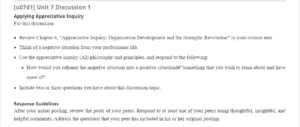Applying Appreciative Inquiry
Appreciative inquiry (AI) is a philosophy of positivity. This philosophy believes that an organization should not be treated as a problem that needs to be solved. Instead, positivity should be the core of the organization and its members as it brings out the best in the organization (Lewis et al., 2016). I have experienced many negative situations in my work history that I may have approached from an AI perspective.
I have worked for several competitive companies in the energy industry. In these companies, internal competition tends to be quite high. One of my negative professional experiences was related to the high level of competition. I had a workmate who would constantly do things to undermine my work so that he could seem like a better performer. Performance was rewarded, so my response to the situation was fighting for what I believed I deserved. This only escalated the situation as it became an experience of back-and-forth undermining of each other’s work. We both ended up performing below expectations.
If I had applied the principles of AI, I would have viewed this situation from a negative perspective. Instead of looking at the situation as a problem, I would have viewed it as an opportunity to collaborate. Maybe if I had communicated my concerns and collaborated with my colleague, we would have achieved our performance goals. This would have been a great learning opportunity instead of being the disaster that it ended up being. In the future, I will try to view problems positively to be a better employee.
References
Lewis, S., Cantore, S., & Passmore, J. (2016). Appreciative Inquiry For Change Management: Using AI To Facilitate Organizational Development. Kogan Page Publishers.
ORDER A PLAGIARISM-FREE PAPER HERE
We’ll write everything from scratch
Question
[u07d1] Unit 7 Discussion 1
Applying Appreciative Inquiry
For this discussion:

Applying Appreciative Inquiry
- Review Chapter 6, “Appreciative Inquiry: Organization Development and the Strengths Revolution” in your custom text.
- Think of a negative situation from your professional life.
- Use the appreciative inquiry (AI) philosophy and principles, and respond to the following:
- How would you reframe the negative situation into a positive situation—something that you wish to learn about and have more of?
- Include two or three questions you have about this discussion topic.
Response Guidelines
After your initial posting, review the posts of your peers. Respond to at least one of your peers using thoughtful, insightful, and helpful comments. Address the questions that your peer has included in his or her original posting.
Resources
Discussion Participation Scoring Guide. DISCUSSION PARTICIPATION SCORING GUIDE
Due Date: Weekly.
Percentage of Course Grade: 30%.
| DISCUSSION PARTICIPATION GRADING RUBRIC | ||||
| Criteria | Non-performance | Basic | Proficient | Distinguished |
| Applies relevant course concepts, theories, or materials correctly. | Does not explain relevant course concepts, theories, or materials. | Explains relevant course concepts, theories, or materials. | Applies relevant course concepts, theories, or materials correctly. | Analyzes course concepts, theories, or materials correctly, using examples or supporting evidence. |
| Collaborates with fellow learners, relating the discussion to relevant course concepts. | Does not collaborate with fellow learners. | Collaborates with fellow learners without relating discussion to the relevant course concepts. | Collaborates with fellow learners, relating the discussion to relevant course concepts. | Collaborates with fellow learners, relating the discussion to relevant course concepts and extending the dialogue. |
| Applies relevant professional, personal, or other real-world experiences. | Does not contribute professional, personal, or other real-world experiences. | Contributes professional, personal, or other real-world experiences, but lacks relevance. | Applies relevant professional, personal, or other real-world experiences. | Applies relevant professional, personal, or other real-world experiences to extend the dialogue. |

